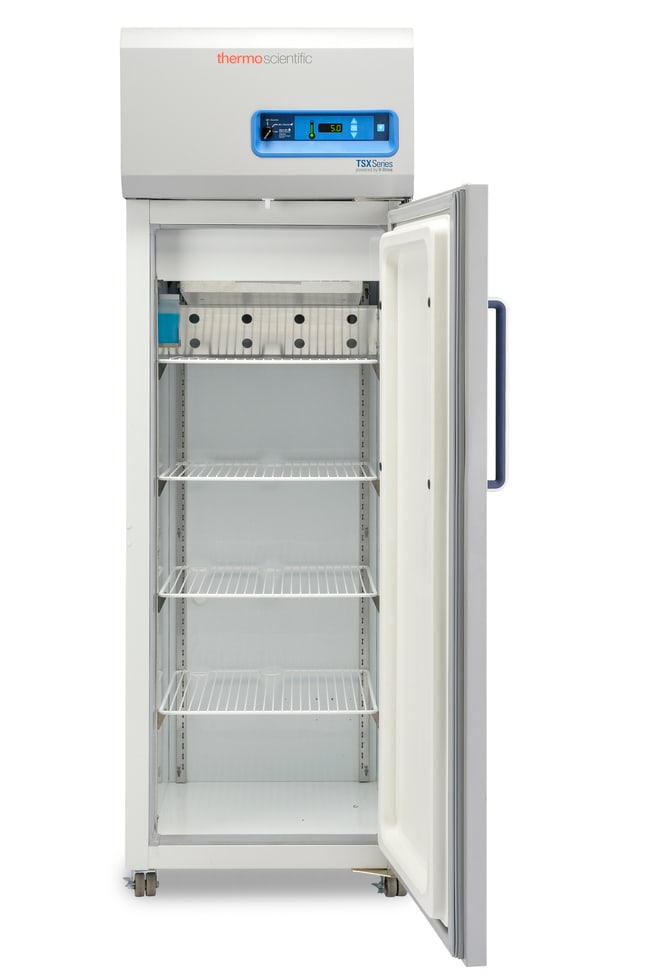Finding Cold Storage Solutions
Never before have biological materials played such a critical role in discovering novel therapeutics and management of public health. Throughout the 20th century, small molecules were the pinnacle of medicine. Now, advanced therapeutic medicinal products include antibodies, cells and tissues.
This shift from chemical to biological entities represents a new era. A pivotal aspect of biological material is that it can degrade, losing structure and function overtime or when exposed to temperatures outside of recommended ranges. Maintaining the proper temperature in the short and long term is crucial to preserving biological functionality.
Laboratory Refrigerators and Freezers
Laboratory or medical-grade cold storage units are designed to minimise temperature variation with technical requirements for peak variation, temperature uniformity and door opening recovery. Retail and commercial refrigerators and freezers are not designed with sensitive laboratory samples in mind.
While shop retail units are considered of some value at their price point, they can experience temperature drift over time, warm and cold spots within the cabinet, and slow recovery after multiple openings. For example, from internal temperature mapping, a 600L retail refrigerator’s peak variation deviation from the lowest and highest temperature, equaled +/-5.5°C. In comparison, the peak variation of a 850L high-performance refrigerator was significantly tighter with a value of +1.3/-2°C.
Non-laboratory and medical-grade units are also generally not tested to laboratory safety standards such as EN 61010 and don’t include usage within the lab in their intended use statements. If failure or damage occurs as a result of the unit, this gap can lead to issues with insurance claims and other coverage.
What Are Your Requirements?
In today’s market, there is a wide breadth and choice for refrigerators and freezers. Below are key questions to determine the best cold storage for your needs:
- What products will you be storing, and are they critical or temperature-sensitive?
- What temperature setpoint and performance are needed to ensure product stability?
- What capacity do you need to ensure you aren’t overcrowding?
- What level of security is required?
- What regulatory and/or sustainability standards are required at your institution?
- Will your equipment need to be qualified or validated for use?
Thermo Fisher Scientific offers several distinct series of biomedical refrigerators and freezers, each with a different set of features and performance criteria to meet your specific application requirements:
- Low energy and F-Gas Compliant Thermo Scientific™ TSX Series High-Performance Refrigerators and Freezers are an essential piece of equipment for any lab working with critical lab samples sensitive to temperature variation, such as vaccines, enzymes, chemotherapy and pharmaceutical compounds and other valuable and sensitive medical and laboratory-grade products. They are available in manual or auto-defrost configurations. Auto-defrost freezers, built for the most demanding applications, use forced air circulation to provide uniform temperature throughout the cabinet and have fast door open recovery. They maintain a lower temperature range near -30°C to minimise temperature increase impact during defrost cycles. Manual defrost freezers are designed specifically for enzyme storage and other biologics where any variation cannot be tolerated. The refrigeration coils are located inside the cabinet walls to provide precise temperature control and stability throughout the chamber.
- Built with the everyday lab in mind, Thermo Scientific™ TSG Series Refrigerators and Freezers are designed for general purpose applications with semi-critical products such as reagents, media, proteins and other samples requiring a controlled environment. This series provides the security and usability the regular laboratory needs while providing a great value-per-cost balance.
Thermo Fisher Scientific provides detailed and accurate performance characteristics for their cold storage equipment to help you determine which solution is right for your application. To help with this selection, Thermo Fisher publishes technical data sheets (TDSs) for our cold storage equipment, which summarises essential data of our products:
- Peak variation from setpoint: The highest thermocouple (TC) temperature difference overall at all times of the entire cycle test period. It simply is the difference between the highest and the lowest temperature observed during closed-door testing on the sample unit.
- Uniformity: The maximum temperature difference between all TCs at any specific moment in time. We publish the average uniformity during the cycle portion of the test.
- Stability: The maximum temperature difference over the entire test for any specific location. The average stability during the cycle is the value published.
- One-minute door open recovery: A one-minute door opening when the average of all the TCs is again below the setpoint.
In labs around the world every workflow and every stage of cold storage has specific requirements. Selecting the right refrigerator and freezer is critical to protect your samples, especially biological materials and vaccines. Purpose-built laboratory medical-grade refrigerators and freezers are designed with precise temperature control to optimise the storage of sensitive and valuable biological materials for research, vaccine and pharmaceutical development.
As the leader in fit-for-purpose products for any cold storage application from 4°C to -196°C, Thermo Fisher is uniquely positioned to recommend the right solution for every stage of your workflow. From preparation to storage to thawing, our globally proven systems are certified for compliance so that you can be confident on paper and in practice.
Content provided by:





